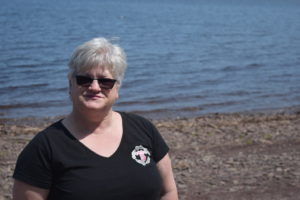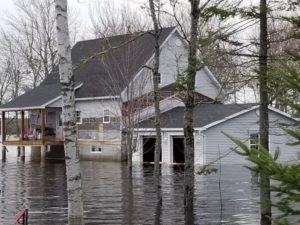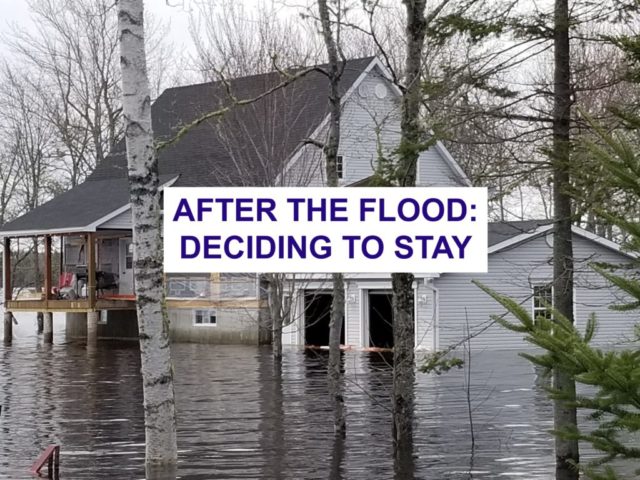The 2018 flood did an estimated $154,000 worth of damage to Elaine Price’s Grand Lake house

Elaine Price describes herself as a country girl; she even met her husband hunting at age 15.
Her home along the shore of Grand Lake allows her to canoe, kayak, fish, skate, snowshoe and bring family up to enjoy the outdoors.
But when the floods came in 2018 – after she already flooded in 2008 – all that changed. She was forced to evacuate.
“We were very scared, frightened, frustrated that it happened again,” Price said. “Just, very sad.”
Not only did water enter her house in 2018, but wind caused waves to pound floodwaters and debris against it. Water surrounded the property on all sides.
The damage was estimated at $154,000, although the emergency measures organization covered some costs. Price lost her appliances and, to mitigate against further damage, she also raised the whole building and added a new foundation.
And so, while others decided to leave Grand Lake, Price and her husband stayed. The area is the embodiment of that country-girl identity and she’s not ready to part with it.
‘I have more anxiety’
She said it’s difficult to explain her reasons to others.
“We have talked about moving, certainly. But we have wonderful neighbours and a mortgage on our house, so that played a big role in our decision,” she said. “As I said, we live here full time on the lake. I guess our love of nature has kept us here.”
Still, the stress affects her. Her relationship with nature has been tested.
This year she saw the water approach her house once more. Luckily, water only entered their crawl space and didn’t do damage.
“Right now, I find I have more anxiety,” Price said.
The Conservation Council recently published a report detailing the negative health effects climate change and the weather events it intensifies has on public health.
“Making the link between climate change and physical and mental health is important because most people do not realize that climate change affects the environmental and social determinants of health and can undermine provincial strategies to improve well-being,” it reads.
“A senior woman, for example, living alone on a low income, with one or more chronic health issues, and who has few social contacts is especially vulnerable to the mental and physical health effects of extreme events made worse by climate change.”

But when the floods came in 2018 – after she already flooded in 2008 – all that changed.
‘Our heart is here’
Now construction on Price’s house is wrapping up. She and her husband were recently allowed to move back in after losing access, again, during the 2019 floods.
But family is important to the couple and having Price’s 91-year-old, wheel-chair-bound mother, her aunt and uncle up for a visit meant the world to her.
When she was younger, the call of a white-throated sparrow would remind Price of her father. He has since died, but when she hears that singing, even when her home was flooding, it causes her to feel better. Like her father is watching over her.
“It think that got me through all of this,” Price said, verging on tears.
She and her husband hope that, with their home raised, their property is protected – even if they can’t live in it for a couple weeks each year. Regardless, the couple have made their decision and are sticking to it.
“Our heart is really here,” Price said.
Part four of our new series, After the flood: how climate change and the extreme weather it’s fueling affect New Brunswickers’ physical and mental health
Recommended links:
- After the flood: anxiety on dry ground
- After the flood: feeling betrayed, twice
- After the flood: putting things into perspective
- New Conservation Council report: climate change, floods, ice storms affect our health
- Read our new report, Healthy Climate, Healthy New Brunswickers: A proposal for New Brunswick that cuts pollution and protects health.

